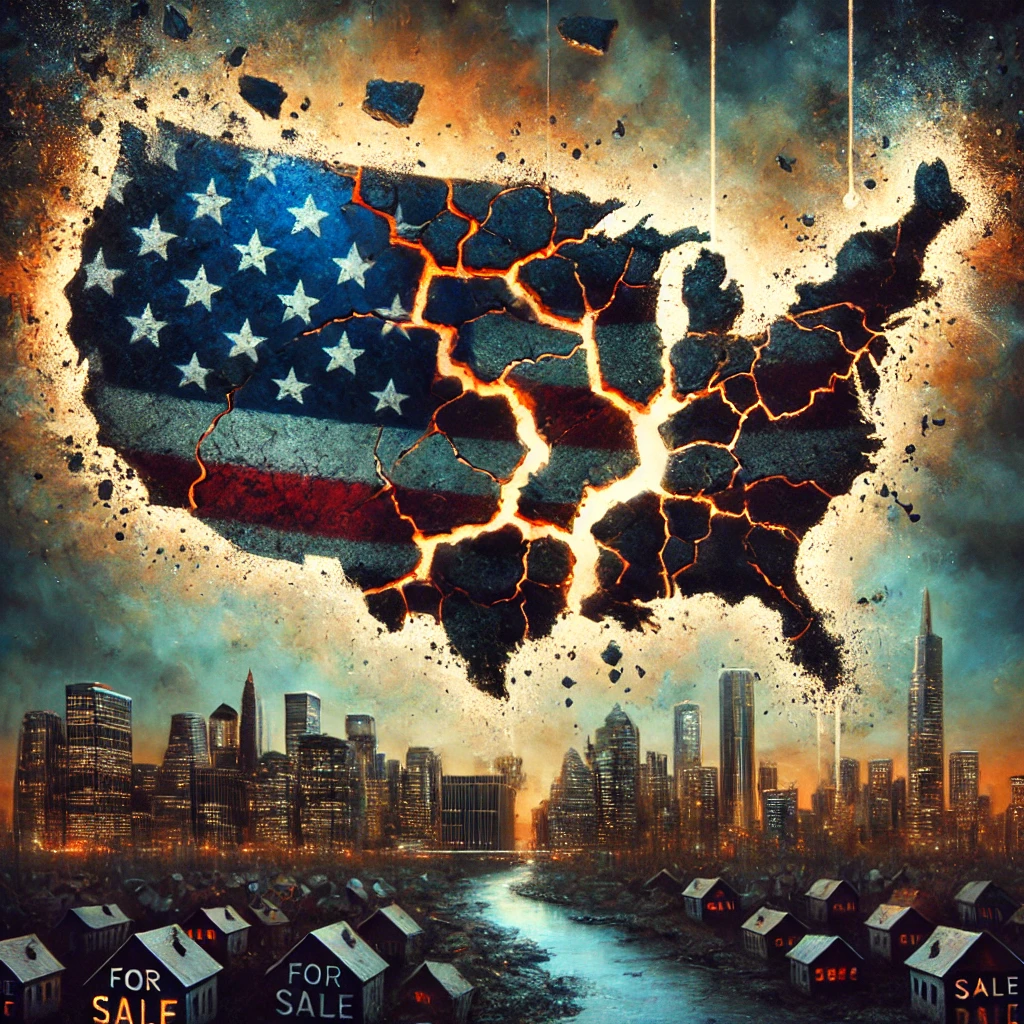I look forward to, in days not so remote, the complete and utter dissolution of the United States of America.
I used to feel an unshakable pride in calling myself an American. Back then, back when I was young and stupid, the notion of America’s greatness felt as inherent as the air I breathed. But that was before I began to wander far beyond her borders. It was before I listened—really listened—to how the world sees us. And it was before I reckoned with the havoc we’ve wrought globally, often under the grandiose banner of freedom and democracy.
Freedom, the cornerstone of our national ethos, once defined us. Or so we believed. But after traversing countries where life feels freer in practice, I’ve come to realize the kind of freedom America offers is often just an illusion. The distinction between freedom as a principle and freedom as an experience has never been clearer to me.
Let’s talk about those “formal freedoms” Americans love to tout. Yes, you can live where you want, start your own business, or travel the world—so long as your wallet can keep up with your dreams. Formal freedoms, enshrined in law, sound lovely until you realize how little they mean without access to the resources that make them tangible. Substantive freedom—freedom you can feel and live, not just imagine—is a rare commodity here. It’s a luxury, not a right.
Take travel, for example. I’ve met expats in Thailand who enjoy lives of leisure on salaries that would barely cover rent in the United States. Meanwhile, back home, Americans grind harder than most and receive far less in return. The so-called “American Dream” feels more like a marketing slogan these days, one that obscures the harsh reality of diminishing returns on work, worsening inequality, and stagnant social mobility.
Or, for another example, take housing. This was something our ancestors could count on—the right to live where they chose, to build a home without bureaucracy or economic barriers strangling the dream. But today, the choice of where to live feels like a privilege reserved for the elite. Housing prices, once tied to the sweat of your brow and not the speculative whims of the market, are now soaring beyond reach for most Americans.
This is a deeply personal issue for me and my wife. As a young couple, we’ve been priced out of nearly every community we’ve considered. The dream of building a life together in a place we choose has been swallowed by bidding wars and skyrocketing rents. We are not asking for extravagance, we just want the basic dignity of a home over our heads. Is that really too much to ask? Yet, even that has become an unattainable aspiration for so many in our generation.
We’ve been told that with hard work and determination, we can achieve anything. But what happens when the system is rigged, when the ladder to a decent life is missing rungs? The relentless rise in housing costs, paired with stagnant wages, makes it clear: the freedom to live where you choose is a relic of the past. For many of us, it never even existed.
This disillusionment has burrowed deep. It’s hard to summon the energy to make a broken system better when it feels like it wasn’t designed to include you in the first place. My wife and I don’t want to fix this society anymore. We don’t believe in it enough to bother. And we’re not alone in feeling this way. The growing number of Americans who share our disillusionment isn’t a trend. It’s an underlying symptom of a system that has failed its people.
Even more troubling than these few examples, we’ve lost any semblance of a unifying social identity. Modern psychology teaches us that a shared sense of purpose and belonging is essential for a society to function. Nobel laureate Elinor Ostrom identified this as a critical component of successful collective endeavors. But America, fractured along countless fault lines, has strayed far from this basic principle. We no longer see ourselves as part of a whole—just isolated individuals grasping for scraps in a zero-sum game. This means we’re destined for a major reboot.
History shows us that great transformations are born of great upheaval. Sometimes, you have to hit rock bottom to find the clarity to rebuild. And America, for all its achievements, feels like a relic of an era that no longer serves us. The challenges of today—climate change, economic instability, the erosion of trust in institutions—require solutions that our antiquated political structures seem incapable of delivering.
Imagine a society unshackled from the weight of its own myths. A society that trades rugged individualism for collective wisdom. A society that prioritizes well-being over GDP. We have more knowledge at our disposal than ever before, yet we lack the wisdom to use it. The dissolution of America, as we know it, could be the first step toward a new social order—one built on humility, cooperation, and an honest reckoning with the past.
Partisan divides have turned America into a battleground. The left and right have become caricatures of themselves, each convinced the other is the enemy. But what if we abandoned this tired game altogether? Progress doesn’t require perpetual conflict. It demands forward momentum, unburdened by the baggage of ideological warfare. No left, no right—just forward.
The truth is, we’re in the midst of a Major Societal Evolutionary Transition (MSET). Biologists might compare it to the kind of upheaval that leads to a new species. In social terms, this transition is driven by intense pressure on our collective identity. We’re being forced to confront who we are, who we’ve been, and who we want to become.
The United States, as it stands, may not survive this transformation. But perhaps that’s not a tragedy. Perhaps it’s an opportunity. After all, the dissolution of old structures is often the first step toward something greater.
It’s easy to romanticize the past or cling to the familiar out of fear. But America’s story isn’t just one of freedom and innovation—it’s also one of exploitation, inequality, and hubris. We can honor the good without ignoring the harm. And we can build something better in its place.
As I write this, I find myself thinking of a line from Leonard Cohen: “There is a crack in everything; that’s how the light gets in.” America is cracked, and the light is pouring through. What we do with it is up to us.
Let the dissolution of the United States be not an end, but a beginning—a chance to imagine and create a society worthy of the ideals we once claimed to hold dear.

